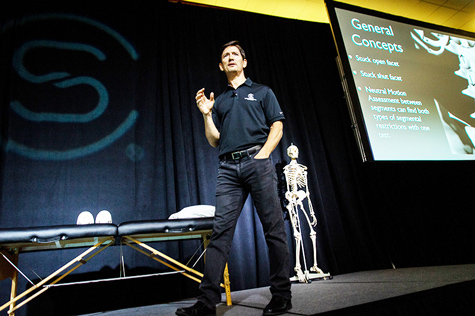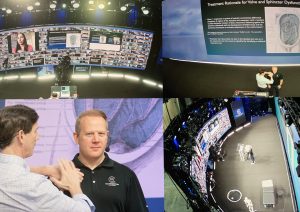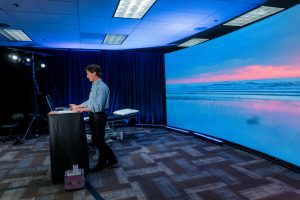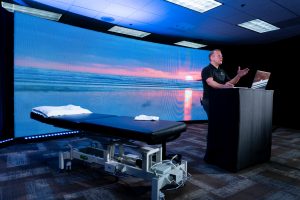Fascial Counterstrain Virtual Course Updates – Video Series
This is a unique opportunity to bring your FCS skills up to speed with one series of courses you can complete from home. Learn game changers like Motion Testing, Touch Inhibition, Key Lesion Identification and updates to multiple systems!

How does this work?
- Obtain credit for each FCS course update by completing the corresponding video series. (See course details below)
- Purchase one or several video courses and immediately gain access to the videos in your Counterstrain Academy Video Library.
- Your registration details will be delivered to host partners (Jones Institue, Kiné Formations, Manual Therapy Institute) to enable you to register for FCS Central Sensitization (FCS CSS) courses.
- The credit from the video series courses is identical to credit received by attending the Counterstrain Convention 2021. If you only attended some courses, you may purchase additional video courses.
- Note: Due to the nature of the important information presented in first video series, it will be mandatory and included with video series 2, 4, and 5 (unless you have already purchased it previously.)
How do I get the most out of these virtual courses?
- We strongly recommend that you reserve at least a full day to complete each course.
- Line up a demo patient or lab partner to practice during each lab session.
- Take the learning seriously and make sure you can devote time to complete the course undisturbed.
CSC 2021 Video Series Description
Video Series 1: CSC 2021 Intro and Motion Testing Add to Cart
(mandatory in order to purchase Video Series 2, 4, and 5)
Prerequisite: 3-Day FCS FI Course Completion
Instructor: Brian Tuckey, PT, OCS, JSCCI
Overview: In order to fully incorporate the curriculum presented from the convention and learn the latest Counterstrain

Brian Tuckey, PT, OCS, JSCCI – Originator of Fascial Counterstrain
updates and policies, you are encouraged to listen and participate in the first video series. The series includes informative talks from Brian Tuckey, PT, OCS, JSCCI and Tim Hodges, LMT, JSCCI, CACI, need-to-know information about the future of Counterstrain, NEW and EXPANDED Motion Testing for rapid full-body motion assessment, Touch Inhibition, and a NEW FCS Rationale with major updates for 2021. Motion testing is only taught at the CS convention and is a “must have” for any practitioner wishes to reach mastery level. Brian discusses his recently published article “Impaired Lymphatic Drainage and Interstitial Inflammatory Stasis in Chronic Musculoskeletal and Idiopathic Pain Syndromes: Exploring a Novel Mechanism” published to Frontiers In Pain Research.
NCBTMB Distance Learning CEU: 9 hours
Video Series 2: Surface Anatomy, Scar & Key Lesion Identification Add to Cart
Prerequisite: 3-Day FCS FI Course Completion
Instructor: Brian Tuckey, PT, OCS, JSCCI and Tim Hodges, LMT, JSCCI, CACI

Overview: Tim Hodges, LMT, JSCCI, CACI will dive into the foundation anatomy for FCS. Get the most out of the new CSS1& upcoming CSS3 courses by reviewing Cranial Surface Anatomy. Also included is the newly added FCS for Scar Tissue and Key Lesion Identification. Both are game-changers; arguably the biggest paradigm shift since the introduction of Fascial Counterstrain! Until recently, the standard approach for Fascial Counterstrain has been based on our understanding of the protective reflexive mechanism. The body’s response to a scar or damaged tissue is pathological and shows up in the scan differently. A lack of understanding in this area holds most practitioners back from long-lasting results because the body will place the protective reflex back in place in response to scarring. This new realization adds another layer of specificity. Now, we have the ability to determine if scar treatment should be prioritized. Don’t miss this important update in the field of Fascial Counterstrain!
NCBTMB Distance Learning CEU: 9 hours
Video Series 3: FCS Nerve Supplemental Course (N1 Supplemental) Add to Cart

Prerequisite: 3-Day FCS N1 Course Completion
Instructor: Brian Tuckey, PT, OCS, JSCCI
Overview: So many updates are packed into this course, it will be considered the FCS N1 Supplemental course onlyavailable through the CS Convention, subsequent video series, and 3D N1 Supplemental course. Get FCS updates for the Anterior and Posterior Epidural Ligaments. These latest techniques are good for nerve pain, global burning, radiculopathies, sciatia, neural/dural pain, and sharp/grabbing pain. Another game-changer to add to your treatments!
Note: This course is the prerequisite for the upcoming 3D N1 Supplemental course.
NCBTMB Distance Learning CEU: 9 hours
Video Series 4: FCS Visceral Updates Add to Cart
Prerequisite: 3-Day FCS VC Course Completion
Instructor: Brian Tuckey, PT, OCS, JSCCI

Brian Tuckey, PT, OCS, JSCCI – Originator of Fascial Counterstrain
The Visceral system was the first course in the Fascial Series taught by Brian Tuckey, PT, OCS, JSCCI starting with approximately 40 individual techniques. The FCS Visceral course now includes over 80! Powerful new cardiac updates have been added over the last 2 years, including the internal valve structure of the heart (2019), and the pericardium (2018). The newest and most significant update since FCS for the visceral system was released in 2008, is the addition of the techniques applied to the visceral layer known as the mesentery.
Overview: In this course update for the Visceral System, learn an updated Mesentery scan, and add new points for the lateral mesentery that relate to the meso-esophagus, the heart and lung mesentery and posterior and lateral attachment of the small bowel mesentery and multiple new points for the meso-rectum. In addition, explore FCS approaches for visceral fibrosis/scarring vs incisional scarring, learn to differentiate between large and small bowel mesentery, and how to differentiate between visceral and mesenteric scans which can help avoid false positives, until you take CSS2.
NCBTMB Distance Learning CEU: 9 hours
Video Series 5: Pre-Certification Review for upcoming CS Certification Level 1 Add to Cart
Prerequisite: 3-Day FCS FI, FCS LV, FCS MS1, FCS MS2, FCS MS3 Course Completions
Instructor: Timothy Hodges, LMT, JSCCI, CACI
Overview: Pre-Certification Review is focused on the FCS Level 1 Courses: FCS FI, FCS LV, and the FCS Musculoskeletal Series MS1, MS2, and MS3.
The official Counterstrain Certification Program will follow the completion of the currently in-development Central Sensitization Series. Once those courses are completed, Brian will offer three levels of Counterstrain certification that will provide practitioners with an FCS credential. The first-ever Fascial Counterstrain credentials are a recognition that you have achieved a high level of proficiency with FCS. This CSC credential gives you a designation of capability that sets you apart.
Counterstrain Certification Levels:
-
CSC1: FCS FI, FCS LV, FCS MS1, FCS MS2, FCS MS3, (End Plate Supplemental – required for certification not for this course)

Tim Hodges, LMT, JSCCI, CACI
- CSC2: FCS VC, FCS AR, FCS N1, FCS N2
- CSC3: FCS CSS1, FCS CSS2, FCS CSS3
In this pre-certification review course, we will cover in detail scans for each of the Level 1 courses (FCS FI, FCS LV, FCS MS1, FCS MS2, FCS MS3). Scans covered will be all of the FCS introductory scans, MS1 scans for the ligamentous and myofascial treatment, bone scans for MS2, cartilage, superficial fascia, and eye and TMJ myochains for MS3. In addition, we will cover treatment strategies, methods of surface anatomy verification, review tender point locations, and perform random tender point treatment assessment. This ensures that practitioners who obtain a Fascial Counterstrain certification-level credential from the Counterstrain Academy or any host partner must be able to demonstrate proficiency for all of the elements required. Of all the things that are necessary to be successful with this group of FCS courses, there are few that stand out as being most important. For this reason there will be an emphasis on cranial scan diagnostics, segmental motion testing as it relates to the musculoskeletal system, tender point assessment capability, and the ability to turn off the associated tender points. Additionally, we will cover how to address scars in various systems and standard approaches for commonly found problems or complains such as plantar fasciitis, low back pain, headaches, rotator cuff problems, and sports related injuries.
NCBTMB Distance Learning CEU: N/A
CSC 2020 Video Series Description
Video Series 1: CSC 2020 Intro Motion Testing and Scar Tissue Add to Cart
Part 1: Introduction to CS Convention 2020, Keynote & Writing Exercises
In order to fully incorporate the curriculum presented from the convention and learn the latest Counterstrain updates and policies, you are encouraged to listen and participate in the first video series. Part 1 includes informative talks from Brian Tuckey, PT, OCS, JSCCI and Tim Hodges, LMT, JSCCI, CACI, need-to-know information about the future of Counterstrain, and writing exercises.
Part 2: Segmental Motion Testing
Prerequisite: 3-Day FCS FI Course Completion
Instructor: Brian Tuckey, PT, OCS, JSCCI
Brian Tuckey, PT, OCS, JSCCI will present a course on what he calls “reflexive motion testing.” This is a proprietary form of mobility testing, developed over a 30 year period, which allows you to identify in three dimensions, the exact location of all types of neuromuscular dysfunction. Once mastered, this skill gives you an additional, and completely independent test, that will enable you to identify the primary osteopathic lesion. Brian uses this assessment technique on every patient he sees and states that it is one of the primary tools he utilized to develop FCS. Reflexive motion testing is only taught at the CS convention and is a “must have” for any practitioner wishes to reach mastery level.
Part 3: Scar Tissue
Prerequisite: 3-Day FCS FI Course Completion
Instructor: Brian Tuckey, PT, OCS, JSCCI
This NEW course is a game-changer; arguably the biggest paradigm shift since the introduction of Fascial Counterstrain! Until recently, the standard approach for Fascial Counterstrain has been based on our understanding of the protective reflexive mechanism. The body’s response to a scar or damaged tissue is pathological and shows up in the scan differently. A lack of understanding in this area holds most practitioners back from long-lasting results because the body will place the protective reflex back in place in response to scarring. This new realization adds another layer of specificity. Now, we have the ability to determine if scar treatment should be prioritized. Don’t miss this important update in the field of Fascial Counterstrain!
NCBTMB Distance Learning CEU: 9 hours
Video Series 2: NEW MS2 End Plates Add to Cart
Prerequisite: 3-Day FCS MS2 Course Completion
Instructor: Brian Tuckey, PT, OCS, JSCCI
Overview: Brian has identified over 20 new periosteal techniques since the debut of FCS MS2 2018! These recent, never-been-taught, discoveries address “end-plate dysfunctions” of the long bones which are responsible for everyday conditions such as plantar fasciitis, osteoarthritis of the fingers, hammer toes, tennis elbow, ankle arthritis and inhibited quadriceps muscles. These endplate techniques are NOT clean-up techniques; you will utilize them daily in the clinic. Additionally, the hand foot endplate techniques, like all distal sympathetic branches, have central connections into the autonomic nervous system and are key in the treatment of conditions like CRPS.
Convention FCS MS2 Course Updates: This update course will focus on brand new techniques for upper and lower extremities. Techniques for the long bones of the upper extremity will be taught covering the humerus, radius, ulna, and metacarpals. In addition techniques for the long bones of the lower extremity will be taught including the femur, tibia, fibula, and the metatarsals.
NCBTMB Distance Learning CEU: 9 hours
Video Series 3: FCS Visceral Mesentery Updates Add to Cart
Prerequisite: 3-Day FCS VC Course Completion
NOTE: CSC 2021 has a full update of Mesentery techniques that now supersedes this course. Please click here for the most recent update. Or, if you would simply like to view this course go ahead and purchase access to it!
Instructor: Brian Tuckey, PT, OCS, JSCCI
Overview: The Visceral system was the first course in the Fascial Series taught by Brian Tuckey, PT, OCS, JSCCI starting with approximately 40 individual techniques. The FCS Visceral course now includes over 80! Powerful new cardiac updates have been added over the last 2 years, including the internal valve structure of the heart (2019), and the pericardium (2018). The newest and most significant update since FCS for the visceral system was released in 2008, is the addition of the techniques applied to the visceral layer known as the mesentery.
Convention FCS VC Course Updates: This update course will include the new mesentery system introduced in 2020 including approximately 26 new techniques that address the mesentery in a segmental fashion from the head to the sacral coccygeal joint. Additional updates include the internal valve structure of the heart & the pericardium. Impact chronic back pain, pelvic pain, breathing restrictions, small and large intestine complaints, irritable bowel syndrome, constipation, food sensitivities, postural issues, loss of spinal ROM, headaches, migraines, upper and lower extremity complaints.
Note: This CSC VC update course fulfills the requirement for the upcoming FCS CSS Series. Please see FCS CSS requirements below for more details.
NCBTMB Distance Learning CEU: 9 hours
Video Series 4: Lymphatic/Venous Updates Add to Cart
Prerequisite: 3-Day FCS LV Course Completion
Instructor: Timothy Hodges, LMT, JSCCI, CACI
Overview: While the first venous treatments were introduced in 2012, it wasn’t until 2016 that the epidural regions were identified and subsequent treatments added to the FCS LV course. In 2017, segmental medullary veins were identified and added to the curriculum. As of April 2019, the deep drainage pathways of the spinal cord were identified and added to the FCS LV curriculum.
Convention FCS LV Course Updates: This update course will target multiple layers of the central nervous system drainage pathways and is designed to provide you with all major updates taught since 2016. You will review 3 different sub-systems within the LV system as a whole – specifically targeting the spinal cord: epidural veins, spinal medullary veins & anterior and posterior spinal cord veins. Impact centrally sensitized patients, reduce centrally mediated muscle spasms, calm CNS tremors, restless legs and reduce or eliminate chronic pain. The latest updates are an absolute game-changer for your most complex patients.
Note: This CSC LV update course fulfills the requirement for the upcoming FCS CSS Series. Please see FCS CSS requirements below for more details.
NCBTMB Distance Learning CEU: 9 hours
Video Series 5: FCS Arterial Updates Add to Cart
Prerequisite: 3-Day FCS AR Course Completion
Instructor: Timothy Hodges, LMT, JSCCI, CACI
Overview: FCS Arterial course was introduced in 2012. In 2014, the radicular arteries of the thoracic spine were discovered. No major change to the deep cord arterial supply treatment was added until 2017 when medullary arteries were introduced. In 2019 the deep arterial supply of the spinal cord was added, addressing the very small yet powerful vessels within the spinal cord itself. This is arguably the most significant and powerful update to the arterial system since it debuted in 2012.
Convention FCS AR Course Updates: This update course will cover the latest techniques including spinal flexion and extension arteries. These techniques address the arteries that supply blood directly into the spinal cord which have been vital in the treatment of chronic pain and complex, failed cases. Learn a collection of techniques including: spinal arteries, medullary arteries, and the segmental arterial system. Help improve sensation, decrease peripheral and idiopathic neuropathies & reduce persistent weakness by increasing the functional capacity of the central nervous system.
Note: This CSC AR update course fulfills the requirement for the upcoming FCS CSS Series. Please see FCS CSS requirements below for more details.
NCBTMB Distance Learning CEU: 9 hours
| CSS Course | Required | Recommended | Virtual Course Equivalent |
|---|---|---|---|
| FCS CSS 1 | FCS LV completed 7/2017 or later | FCS LV & FCS AR 2019 or later, FCS VC 2020 or later | CSC 2020 L/V Updates, CSC Arterial Updates, Visceral Mesentery Updates |
| FCS CSS 2 | FCS LV completed 7/2017 or later | FCS LV & FCS AR 2019 or later, FCS VC 2020 or later | CSC 2020 L/V Updates, CSC Arterial Updates, Visceral Mesentery Updates |
| FCS CSS 3 | FCS LV and FCS AR completed 2019 or later | FCS LV & FCS AR 2019 or later, FCS VC 2020 or later | CSC 2020 L/V Updates, CSC Arterial Updates, Visceral Mesentery Updates |
Would you like more information on the entire Fascial Counterstrain training curriculum and prerequisites? Check out our Fascial Counterstrain Training section for more details.